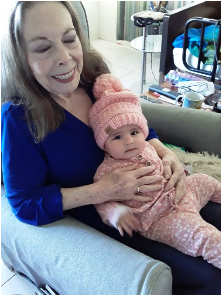An interview with Ginger Smith on Advocacy on August 26, 2023 by George Ackerman, Ph.D, J.D.
Biography
My life has been full of drama and happiness growing up in beautiful Northern California. I spent 8 years in boarding schools due to abuse. I overcame addiction and am now clean and sober. After raising my two sons I went back to college.

Please tell me a little about your background.
I earned a Master of Science degree with honors and became a speech language pathologist. I also studied at Stanford University and worked in Stanford neurology clinic and did home care. I had a wonderful successful career.
Can you tell me more about your advocacy?
I’m self employed as a speech consultant.
What is your passion and how did you get involved in Parkinson’s awareness and hope for a cure?
Ten years ago, I had to retire as a speech language pathologist due to encroaching Parkinson’s symptoms such as hand tremors, shuffling walk, confusion. I fell 8 times requiring firefighters to get me up as my body betrayed me. I ended up in nursing homes in a wheelchair. Two years later I was in hospice bedridden, aphasic, hallucinating, tremoring, paranoid, emaciated, dysphagic, with fluctuating cognition, mood, and physicality.
At that time, it was thought I may have had Lewy body dementia. All curative medications were withdrawn, and I slowly started to get better mysteriously (neuroplasticity, resilience, autophagy– i has lost 140 pounds because I refused to eat, I thought the food was lava and compassion–I wanted to help my caregivers so much I was determined to stand, and I did it starting my path of getting well. Now two years later I’m home. After that terrifying experience I am committed to help people with neurodegenerative disease and Parkinson’s having experienced what I thought was the horror of its final stage.
What type of goals do individuals with Parkinson’s have when working with you?
My goal is to provide information and training for individuals as I had an experience, that I lived through and can explain why I did and thought.
What type of training and how long are the programs?
I would like to use social media especially zoom to train both individuals with Parkinson’s and care partners. I would not charge and estimate a program of one hour six to ten sessions.
What effect can it have on an individual with Parkinson’s?
Comfort and compassion as I can describe why I refused food or medicine, why I hated showers. I can help with their speech issues, volume for instance.
What would you like to see as a future goal for your programs?
Improved behaviors, more cooperation, improved communication.
What events do you participate in?
Katya DeLuisa’s Dementia program, Lewy Body Dementia Association, LifeRing
Teepa Snow, prominent dementia educator called me a unicorn on an interview due to my unusual history. I do many interviews for instance ProAging, Dr. Lycka, Dementia Action Alliance, Katya program.
How does your advocacy also assist the caregivers?
I can directly help them by describing how I felt, for instance I didn’t hate them or was mean on purpose when I refused to eat. Or I can teach them how to help their loved one’s hallucinations become more pleasant not horrifying by using lucid dreaming technique that helped me when I saw snakes in my bed.
How can someone get in touch? What is your website?
How can others also become advocates for awareness?
I’m active on social media, open for any group for presentations.
If you had one final statement or quote you could leave for the Parkinson’s community, what would it be?
I believe my story of coming through a neurodegenerative disease and able to speak about will provide accurate lived knowledge and hope to the Parkinsons community.

